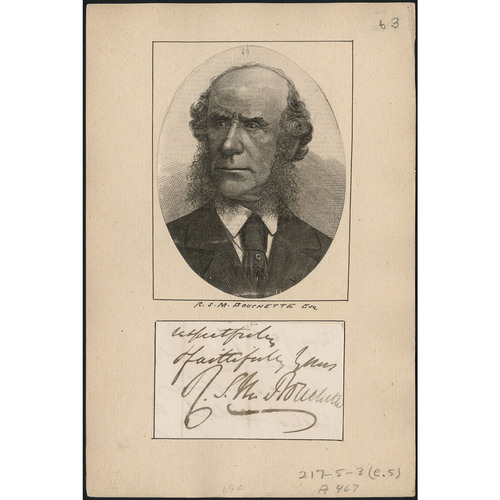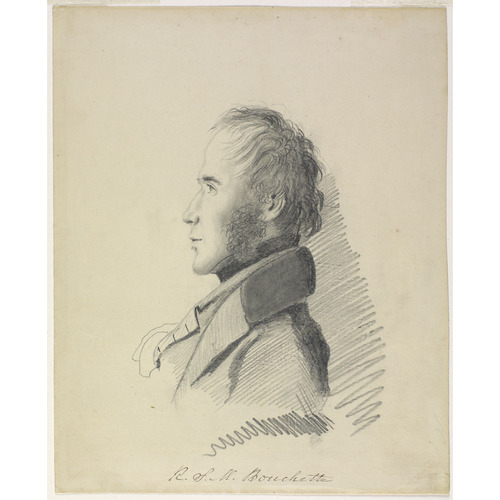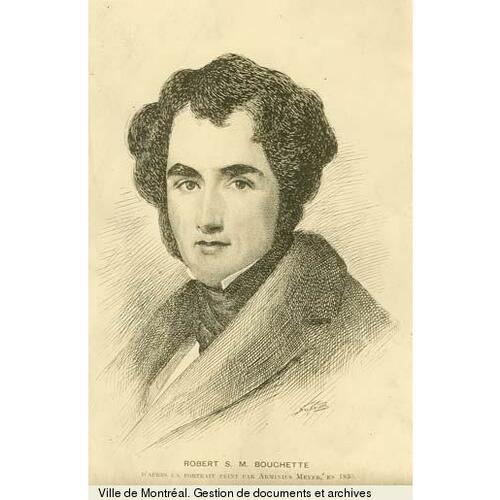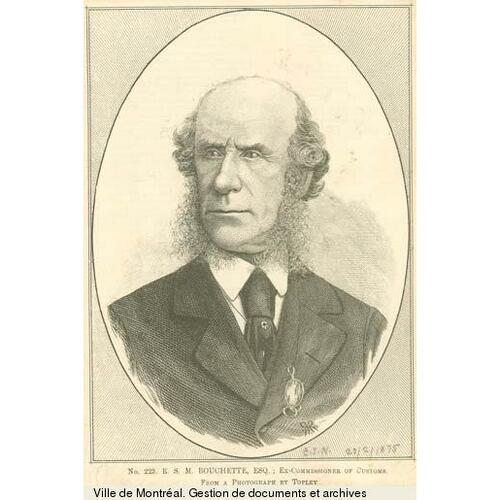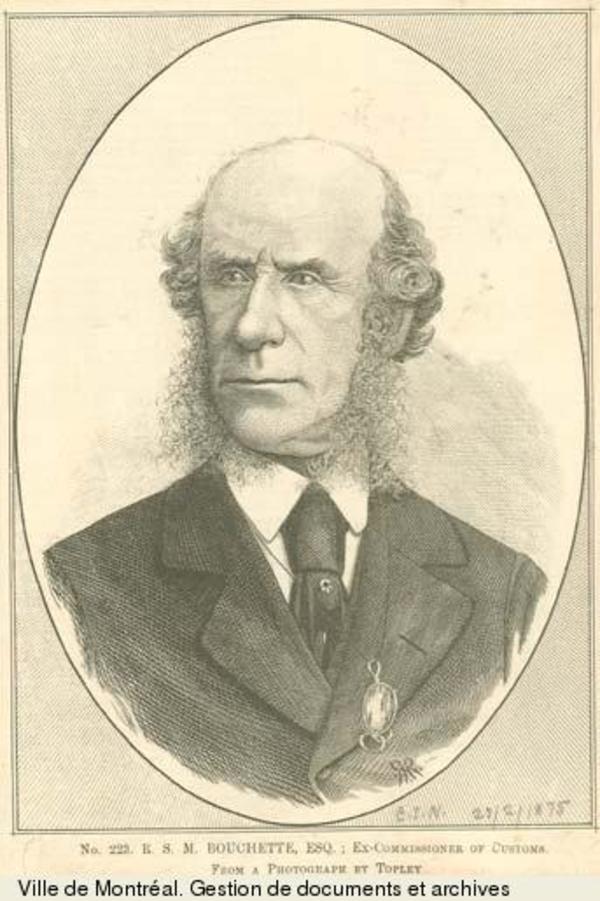
Source: Link
BOUCHETTE, ROBERT-SHORE-MILNES, lawyer, cartographer, Patriote, and civil servant; b. 12 March 1805 at Quebec, L.C., fourth son of Joseph Bouchette*, surveyor general of Lower Canada, and of Marie-Louise-Adélaïde Chaboillez; d. 4 June 1879 at Quebec.
At his baptism Robert-Shore-Milnes Bouchette received the names of his godfather, Sir Robert Shore Milnes*, the lieutenant governor at the time. He studied under the Reverend Daniel Wilkie*, and began to read law as a clerk in the office of Andrew Stuart*, a friend of his father. Although specializing in maritime law, he had a predilection for the study of Italian, history, the humanities, and mathematics: “a relaxation,” he wrote in his Mémoires. Tempted by his “natural liking for drawing and cartography,” and by his “desire to travel,” he temporarily broke off his studies in December 1823 to go to New York as assistant to Lieutenant Henry Piers of the Royal Staff Corps and copy maps of the common border of the United States and Canada. On 15 March 1826, when he was barely 21 years of age, he was admitted to practise law.
Robert Bouchette devoted himself “with ardour” to his new profession until 1828; the following year he was attached to the surveyors’ office, and helped his father to publish his geographical and cartographical work. He went to London and worked at drafting the maps and putting together the topographical and historical description of Canada; the result was two publications by Joseph Bouchette, which appeared in 1831. Thanks to the official position occupied by his father in Canada, Robert Bouchette was able to associate with the English nobility and bourgeoisie, and through this association to meet many important personages of the time. At Dover, when he was returning from a trip to France and Italy, he met Mary Ann Gardner, whom he married on 6 March 1834. On 27 July, a few months after they arrived in Canada, the young Englishwoman died, a victim of the Asiatic cholera epidemic.
This sudden bereavement, added to the political situation, was a decisive turning-point in Bouchette’s life. He came round “without hesitation to the side of the Liberals, although,” he said, “it was very painful for me to break off from my family and many of my personal friends, who sympathized with the party that had adopted, quite wrongly, the title of constitutional.” Robert Bouchette stood as parliamentary candidate for Saguenay County in February 1836, but his opponent, Charles Drolet, also a Liberal, gained the victory, thanks to Louis-Joseph Papineau’s influence. The defeated candidate subsequently took an active part in the meetings held in the Quebec region to protest Lord John Russell’s resolutions. On 17 June 1837 he founded at Quebec a bilingual newspaper, Le Libéral/The Liberal, the editing of the English part of which he entrusted to his friend Charles Hunter*.
As Bouchette came within the provisions of warrants for arrest issued against chairmen of the Patriote committees, the Quebec editor was arrested, then let out on bail shortly afterwards. He quickly left Quebec and headed for the Richelieu valley, finally reaching Swanton in Vermont. On 6 Dec. 1837, as an officer under the command of Édouard-Élisée Malhiot, Robert Bouchette led the advance-guard of the little band that encountered the enemy at Moore’s Corner (Saint-Armand-Station) [see Philip Henry Moore]. He was wounded, and put in prison at Montreal, and on 28 June 1838 was condemned to exile in the Bermudas with seven other Patriotes, from whom Durham [Lambton*] had extracted the semblance of a confession of guilt. Bouchette left Quebec on 4 July on board the frigate Vestal, and arrived in the Bermudas on the 28th, after a crossing that gave him time, in collaboration with Wolfred Nelson*, to write an account of the Canadiens’ grievances. After the abrogation of Durham’s ordinance, Bouchette left his place of exile and headed for the American coast. In 1839 he was called to the bar in Vermont, and in the same year married Caroline-Anne Berthelot.
He returned to Canada in 1845, after the nolle prosequi of 1843, and three years later was appointed court clerk of the attorney general for Canada East; in March 1851 he was named to the post of collector of customs. In addition to looking after the organization of this department, Robert Bouchette was a member of several government commissions, including those responsible for studying the results of the treaty of reciprocity with the United States (1860), the organization of the civil service (1862), Canada’s participation in the universal exposition of 1867 in Paris – Joseph-Charles Taché* and he were Canada’s official representatives there – and the repercussions of the new civil service law (1868).
Having become a widower for the second time on 28 Jan. 1858, Robert Bouchette married again on 11 June 1861; his third wife was Clara Lindsay, by whom he had, among other children, Robert-Errol*. He withdrew from the civil service in 1875, and died at Quebec. He was buried at Saint-Colomb-de-Sillery.
In the forefront of the Patriote movement, for which he bore arms and wielded the pen with spirit and enthusiasm, Robert Bouchette caused a scandal by breaking with the environment of his family and its bureaucratic allegiance. This same enthusiasm was apparent when he was collector of customs: he built up this department and defended its organization by presenting a personal report different from that of the commission responsible for studying the repercussions of the new civil service law. This zeal did not prevent him from entertaining some aesthetic pretensions when he turned to drawing and cartography, and when he enlivened his prison cell at Montreal, decorating it with his guitar and with drawings from his portfolios.
PAC, MG 24, D8/1 (Wright papers), 4503, 4504, 12139–42, 12334–36, 12391, 12392, 12420, 12421, 12570, 12571, 13611, 13612, 16379–82, 17276; MG 29, G27 (Morgan papers), 3, pp.937–44; Map Division, various manuscript maps copied by Robert-Shore-Milnes Bouchette. [R.-S.-M. Bouchette], Mémoires de Robert-S.-M. Bouchette, 1805–1840; recueillis par son fils Errol Bouchette et annotés par A.-D. Decelles (Montréal, [1903]); R.-S.-M. Bouchette “Weights and measures,” Lit. and Hist. Soc. of Quebec, Trans., new ser., I (1863), 1–33. R.-S.-M. Bouchette and Wolfred Nelson, “Brief sketch of Canadian affairs,” Canadian Antiquarian and Numismatic J. (Montreal), 3rd ser., XIII (1916), 21–29. “Inventaire des documents relatifs aux événements de 1837 et 1838, conservés aux archives de la province de Québec,” APQ Rapport, 1925–26, 188–89, 272–73, 283, 327. “Papiers Duvernay conservés aux archives de la province de Québec,” APQ Rapport, 1926–27, 147–252. Canada, Sessional Papers, II (1869), pt.5, no.19, 39–40. Standard dict. of Can. biog. (Roberts and Tunnell), I, 62–63. Fauteux, Patriotes, 126–28. P.-G. Roy, La famille Taschereau (Lévis, Qué., 1901), 35–36. “Robert-Shore-Milnes Bouchette,” BRH, XXXII (1926), 563.
Cite This Article
Yves Tessier, “BOUCHETTE, ROBERT-SHORE-MILNES,” in Dictionary of Canadian Biography, vol. 10, University of Toronto/Université Laval, 2003–, accessed January 20, 2025, https://www.biographi.ca/en/bio/bouchette_robert_shore_milnes_10E.html.
The citation above shows the format for footnotes and endnotes according to the Chicago manual of style (16th edition). Information to be used in other citation formats:
| Permalink: | https://www.biographi.ca/en/bio/bouchette_robert_shore_milnes_10E.html |
| Author of Article: | Yves Tessier |
| Title of Article: | BOUCHETTE, ROBERT-SHORE-MILNES |
| Publication Name: | Dictionary of Canadian Biography, vol. 10 |
| Publisher: | University of Toronto/Université Laval |
| Year of revision: | 1972 |
| Access Date: | January 20, 2025 |


